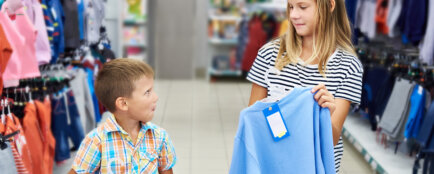The rights and obligations of children from the age of 15 are defined both by the legal framework and by social norms. Children at this age already have a certain legal capacity that allows them to decide on their own affairs, such as choosing a school or a job, but they are also responsible for their behaviour and actions, which may have legal consequences. It is important that parents, teachers and other adults provide children with the right education and support to help them make decisions and to help them understand the impact of their actions on their lives and the lives of others.
What are the rights of children from the age of 15?
From the age of 15, adolescents can start working
One of the important rights that children have from the age of 15 is the right to work. But the law protects young people at this age from excessive burdens and risks that could endanger their health or development. Under labour law, children aged 15 and over can perform light work as permitted by law. However, they must have completed primary education.
However,this work must not take more than 8 hours a day and 40 hours a week. The work should be age-appropriate and provide sufficient time for rest and school duties. You cannot employ a 15-year-old on night shifts. At the same time, minors cannot work in hazardous conditions, for example in heavy industry or with chemicals, and must have regular breaks. They can also forget about the part-time job behind the cash register because under-18s cannot handle cash.
And there’s another catch. Until a minor reaches the age of 16, his or her legal guardian may terminate the minor’s employment contract with the employer in such cases as are necessary in the interests of the minor’s education, development or health.
Are you solving a similar problem?
Don't know what to do with your teenager?
If you need legal advice about your child, for example about his or her part-time job, do not hesitate to contact us. We are here for you in these situations as well.
I'm interested
- When you order, you know what you will get and how much it will cost.
- We handle everything online or in person at one of our 6 offices.
- We handle 8 out of 10 requests within 2 working days.
- We have specialists for every field of law.
Having sex yes, watching it no
Persons who have reached the age of 15 may have sexual intercourse. Of course, only with a person who is also over 15. If one of the people involved has not yet officially celebrated their 15th birthday, their counterpart will be prosecuted, even if they have both engaged in sexual intercourse voluntarily. The paradox in our country is that although we can have sex from the age of 15, we are not allowed to watch erotic videos and consume other similar content until we reach the age of 18.
You can drive a scooter, but not a car
At 15, young people can get a licence to drive a scooter or a small motorcycle. They can start driving school earlier, but they can only take the final test on their 15th birthday. Of course, people are only allowed to drive a car in the Czech Republic from the age of 18.
Open a bank account with your parents’ signature
Saving pocket money in a piggy bank is a nice thing to do, but once young people start working part-time, their employer usually requires them to provide a bank account into which they can send their remuneration. Although a young person can open a personal account when they turn 15, their legal guardian must sign the contract with the bank for that account. He or she is also responsible for any debts associated with the account. After the age of 18, the adult may exclude this representative from managing the account.
Have your say
The right to freedom of expression is very important for children from the age of 15, especially in family and legal matters. Children have the right to express their views on issues affecting their lives, such as deciding where they live in the event of their parents’ divorce, or deciding on their future education. When it comes to court decisions on family matters, children have a right to be heard, which means that the judge should consider their views when deciding on custody, parental visitation and other important issues.
Greater privacy from parents
From the age of 15, children also have a right to privacy, which means that their personal lives and communications should be protected from interference by third parties, including their parents. While parents still have some legal responsibilities for the upbringing and care of their children, the right to privacy means that children can have, for example, closed social media accounts or email accounts. Conversations with peers and other activities of their child are therefore not automatically accessible to parents. This privacy protection also extends to personal data, which should be protected from misuse.
With the 15th year also comes responsibilities
Civil liability ensures respect and payment of damages
Children from the age of 15 have a duty to respect the rights of others. This means that they must follow the rules of behaviour in the family, school and in public, and must not harass others or violate their rights. If a child causes damage to another person’ s property or health, he or she is obliged to compensate for it. They also have a duty to respect the rules and standards that are set in their school and work environment. This topic is closely related to so-called civil responsibility.
Tip for article
Tip: Did you know that the state is also responsible? We are talking specifically about the state’s liability for damages. This is the case, for example, if the authorities take too long to act and you suffer damage as a result. Read more about this in our article.
From the age of 15 we are criminally liable
There are pros and cons to everything and this also applies to the rights and obligations of children from the age of 15. As we approach this milestone birthday, we start to be criminally responsible for our actions in the legal sense. This means that we are criminally responsible for the offences and crimes we commit. According to experts, at this age, a person is able to understand the nature and consequences of his or her actions and can distinguish between what is right and what is wrong. The criminal liability of juveniles has specific rules that differ from those for adults. In fact, at this young age, the legal system in our country is still primarily concerned with reform and education, rather than merely punishing the guilty. Punishments for juveniles may therefore include various educational measures.
Even after the age of 15, the law still protects juveniles
Even juveniles over the age of 15 are still covered by the protection of children’s rights. Children, including those aged 15 and over, have the right to protection from abuse, bullying or other forms of violence. Parents or guardians are responsible for ensuring their safety and well-being. If a child faces danger or is in a situation of risk, he or she may contact social workers or other child protection authorities.
Sometimes parents fail to adequately safeguard and protect their child’s rights or even directly violate them themselves. In such cases, a curator or guardian may be appointed to take care of the child’s interests and rights if the family fails to provide for his or her upbringing or protection. A guardian is a legal representative of the child who is involved in decisions about his or her legal affairs, for example in court proceedings or decisions about his or her upbringing.
Tip for article
Tip: Bullying does not avoid adults either. One of the most common forms they encounter is workplace bullying. Read more about it in our article and find out if you have been a victim of bullying.
Summary
Turning 15 not only brings new rights for children, such as the ability to work, open a bank account or get a scooter licence, but also responsibilities in the form of criminal and civil liability for their actions. From this age, young people can make decisions about their own affairs, express their opinions on important issues and enjoy greater privacy. At the same time, however, they face obligations such as following rules or paying for damages. Despite this critical age, they remain protected by laws that ensure their safety and rights. Rights and responsibilities from the age of 15 thus shape their path to adulthood.




